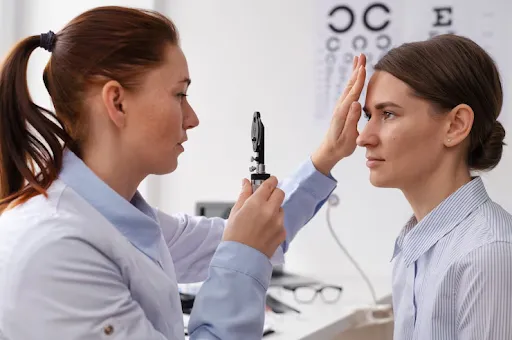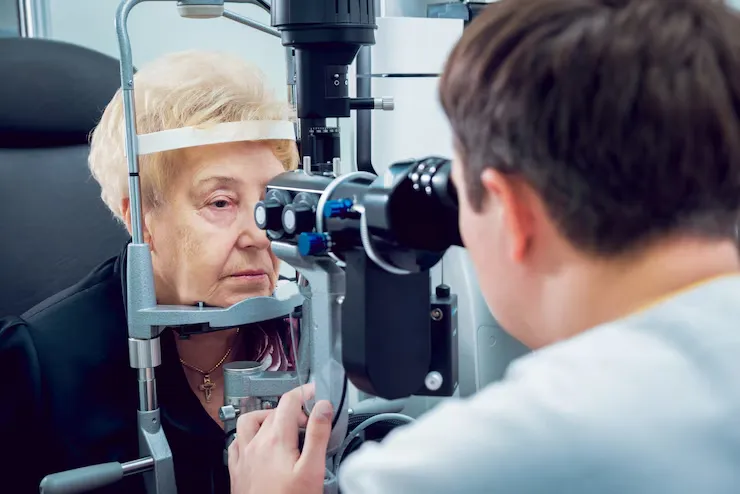Vision and Posture
How Eye Alignment Affects Posture
FSDAVCFEBFEVSDDVFSD
FSDAVCFEBFEVSDDVFSD
FSDAVCFEBFEVSDDVFSD
Why Eye Alignment Matters
Maintaining clear vision requires more than just healthy eyes; it depends heavily on proper alignment. When the eyes are slightly misaligned, the body often compensates unconsciously by adjusting the head and neck position. These adjustments can lead to chronic strain, discomfort, and persistent musculoskeletal issues over time.
Even small discrepancies in visual alignment can trigger larger postural shifts. Many people who experience recurring neck or shoulder pain are unaware that the problem may originate with their eyes. Understanding the connection between posture and eye alignment can help prevent unnecessary discomfort and guide individuals toward effective solutions like specialized vision correction.
Maintaining clear vision requires more than just healthy eyes; it depends heavily on proper alignment. When the eyes are slightly misaligned, the body often compensates unconsciously by adjusting the head and neck position. These adjustments can lead to chronic strain, discomfort, and persistent musculoskeletal issues over time.

Even small discrepancies in visual alignment can trigger larger postural shifts. Many people who experience recurring neck or shoulder pain are unaware that the problem may originate with their eyes. Understanding the connection between posture and eye alignment can help prevent unnecessary discomfort and guide individuals toward effective solutions like specialized vision correction.

Signs of Visual Misalignment
Frequent headaches, neck stiffness, shoulder pain, and even back discomfort may sometimes be linked to visual misalignment. When the eyes are not properly aligned, the brain works overtime to compensate by adjusting head or body posture. Over time, this compensation causes strain and tension throughout the musculoskeletal system. These symptoms are often subtle but can significantly affect a person’s daily comfort.
Another common sign of visual misalignment is eye fatigue. Tasks such as reading, working at a computer, or driving can become increasingly uncomfortable, with individuals often tilting their heads or squinting to achieve clearer vision. This additional strain on the eyes can worsen discomfort, leading to more severe visual strain, especially during prolonged activities.
At Kleinwood Vision, we utilize advanced diagnostic techniques to identify visual misalignment early on. For patients experiencing these symptoms, customized treatments like NeuroLens therapy can provide significant relief. NeuroLens therapy targets the root cause of discomfort by addressing the strain on the visual system. This innovative approach not only improves clarity and comfort but also helps correct posture naturally, allowing patients to experience relief from tension in their neck, shoulders, and back. With personalized care and modern treatment options, Kleinwood Vision ensures long-term eye health and overall well-being.
How NeuroLens Provides Relief

Patients experiencing headaches or neck pain from eye strain can find significant relief with NeuroLens technology. This advanced diagnostic system accurately detects even minor eye misalignments that often cause discomfort. By identifying these misalignments, NeuroLens offers a personalized solution for long-term relief.
NeuroLens custom lenses are crafted with a contoured prism that helps realign the eyes naturally. This reduces the need for the body to compensate, which in turn alleviates head, neck, and shoulder tension.

The lenses help improve visual comfort and reduce the strain that leads to frequent headaches. NeuroLens technology not only enhances visual clarity but also corrects postural issues caused by improper eye alignment. For patients suffering from chronic pain related to eye strain, this innovative treatment provides a practical, non-invasive solution, offering a more comfortable and balanced visual experience.
Misalignment is a common issue, particularly for those who spend extended periods on screens or engage in tasks that require close focus. Over time, the brain attempts to compensate for uneven visual input, leading to discomfort in the head, neck, and shoulders. Kleinwood Vision offers NeuroLens as an innovative, non-invasive solution to address these posture-related symptoms. By improving eye alignment, NeuroLens helps alleviate tension and discomfort, making it easier to perform everyday tasks with greater comfort and ease.
A comprehensive eye exam is the first step in diagnosing visual misalignment and understanding its impact on your overall well-being. At Kleinwood Vision, our specialists use advanced diagnostic tools to detect even subtle misalignments. Many patients experience significant relief within days of wearing NeuroLens, reporting fewer headaches, less neck pain, and improved focus at work or school. With customized treatment and follow-up care, you can achieve long-lasting comfort and better health by addressing the root cause of your visual misalignment.
The Science Behind the Symptoms
When binocular vision is disrupted, the brain works harder to combine two slightly different images into one. This constant effort can lead to symptoms like headaches, blurred vision, and muscle tension in the neck and shoulders. These issues are often mistaken for other health conditions, but the true cause is frequently rooted in the eyes. As the brain tries to compensate, the body is forced to adjust, leading to unnecessary strain.
Postural compensation, such as leaning forward while reading or tilting the head to focus, adds additional stress on muscles not designed for such constant tension. Over time, this can result in chronic discomfort that interferes with daily activities and overall well-being. Proper treatment for visual misalignment can alleviate the strain on the body, providing much-needed relief. By addressing the root cause, it’s possible to reduce symptoms, improve posture, and enhance quality of life.
How Kleinwood Vision Can Help
At Kleinwood Vision, we specialize in detecting visual alignment issues early using advanced technologies like NeuroLens Measurement Devices. During a comprehensive eye exam, we conduct specific tests to identify hidden misalignments that may contribute to headaches, eye strain, or musculoskeletal discomfort.
If misalignment is detected, we recommend customized NeuroLens solutions to help the eyes align naturally. These lenses support proper alignment, reducing strain and alleviating related musculoskeletal issues like neck and shoulder pain.

At Kleinwood Vision, we specialize in detecting visual alignment issues early using advanced technologies like NeuroLens Measurement Devices. During a comprehensive eye exam, we conduct specific tests to identify hidden misalignments that may contribute to headaches, eye strain, or musculoskeletal discomfort.
If misalignment is detected, we recommend customized NeuroLens solutions to help the eyes align naturally. These lenses support proper alignment, reducing strain and alleviating related musculoskeletal issues like neck and shoulder pain.
Ignoring signs like frequent headaches, eye fatigue, or shoulder tightness can allow small issues to worsen into chronic pain. By addressing visual misalignment early, patients can prevent long-term posture problems and discomfort. At Kleinwood Vision, we focus on personalized care, ensuring each patient receives the most effective treatment for their specific needs
Ignoring signs like frequent headaches, eye fatigue, or shoulder tightness can allow small issues to worsen into chronic pain. By addressing visual misalignment early, patients can prevent long-term posture problems and discomfort. At Kleinwood Vision, we focus on personalized care, ensuring each patient receives the most effective treatment for their specific needs
Tips to Support Eye Health and Good Posture
Maintaining good posture is deeply connected to healthy vision habits. Simple practices like taking frequent breaks during screen time and following the 20-20-20 rule can help reduce strain on both the eyes and the body. This rule suggests looking at something 20 feet away for 20 seconds every 20 minutes of screen use, which gives the eyes a chance to relax and refocus. Additionally, adjusting ergonomics at work, such as ensuring your chair, desk, and computer are properly positioned, can prevent poor posture that often leads to neck, shoulder, and back discomfort.
Avoiding slouching or leaning forward during tasks is also crucial. Positioning your screen at eye level reduces the temptation to hunch over, which can strain the neck and back. Adequate lighting is important as well, as dim or excessive light can cause eye fatigue and discomfort. By correcting your workspace setup, you can minimize strain on both your eyes and your posture.
Patients should prioritize regular eye checkups to detect potential issues early. Symptoms such as persistent headaches, neck pain, or visual fatigue can indicate an underlying issue that needs professional attention. Regular eye exams provide the opportunity for early detection and intervention.
For those experiencing visual misalignment or related discomfort, treatments like NeuroLens can dramatically improve comfort and vision. Prescribed by an experienced eye care provider, NeuroLens uses customized lenses to reduce strain and improve alignment, offering long-term relief. Preventive care and proper eye habits are essential to maintaining overall well-being and avoiding chronic pain.
Schedule Your Assessment Today

If you're experiencing symptoms like headaches, neck stiffness, or persistent eye strain, it’s important to schedule an evaluation. Kleinwood Vision offers comprehensive exams that assess both your visual alignment and overall eye health, ensuring any hidden issues are identified early.
By getting the right diagnosis, you can begin the proper treatment, whether it’s customized NeuroLens therapy or adjustments to your daily habits. Ignoring subtle vision problems can lead to ongoing discomfort and poor posture, affecting your daily life.
If you're experiencing symptoms like headaches, neck stiffness, or persistent eye strain, it’s important to schedule an evaluation. Kleinwood Vision offers comprehensive exams that assess both your visual alignment and overall eye health, ensuring any hidden issues are identified early.
By getting the right diagnosis, you can begin the proper treatment, whether it’s customized NeuroLens therapy or adjustments to your daily habits. Ignoring subtle vision problems can lead to ongoing discomfort and poor posture, affecting your daily life.
Taking action now with a simple eye exam can prevent long-term musculoskeletal discomfort and improve your overall health. Kleinwood Vision is here to help you achieve clearer vision, better comfort, and a more balanced posture, enabling you to feel and move freely again. Let us help you see and feel your best.
Taking action now with a simple eye exam can prevent long-term musculoskeletal discomfort and improve your overall health. Kleinwood Vision is here to help you achieve clearer vision, better comfort, and a more balanced posture, enabling you to feel and move freely again. Let us help you see and feel your best.
Final Thoughts on Vision and Posture
Good vision is essential for maintaining proper posture and avoiding unnecessary physical strain. When eye misalignment occurs, it affects more than just how you see—it influences how you stand, move, and feel throughout the day. Subtle misalignments can lead to tension and discomfort in the neck, shoulders, and back, making it harder to perform daily activities.
At Kleinwood Vision, we address these issues using advanced solutions like NeuroLens, which helps correct misalignment and relieve physical strain. By restoring proper alignment, NeuroLens can improve comfort and reduce the risk of long-term musculoskeletal problems. Our experienced team is committed to diagnosing and treating visual misalignment early, ensuring your posture and overall health are supported. Trust Kleinwood Vision to help you see clearly, feel better, and maintain a pain-free lifestyle. For personalized care and expert solutions, contact Kleinwood Vision and let us guide you toward better vision and improved well-being.

Contact Info
Hours of Operation
Mon - Fri | 9:00 AM - 5:00 PM
Sat - Sun | Closed
Holiday Hours: We are closed for the following holidays: New Years Day, Memorial Day, Independence Day, Labor Day, Thanksgiving Day, Christmas Day
© 2026 Kleinwood Vision. All rights Reserved.


